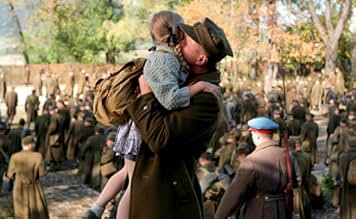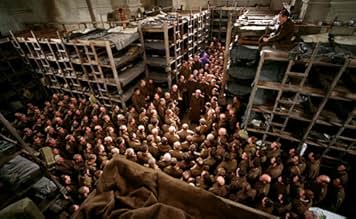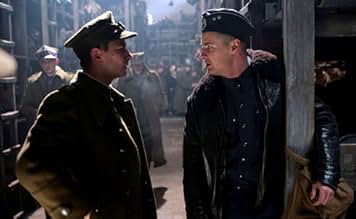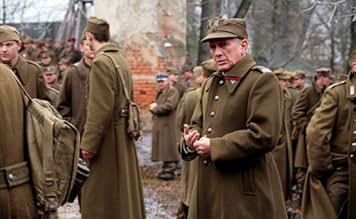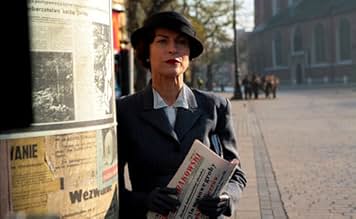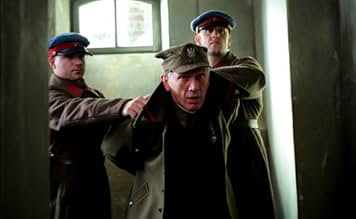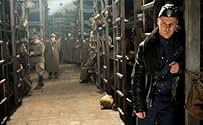An examination of the Soviet slaughter of thousands of Polish officers and citizens in the Katyn forest in 1940.An examination of the Soviet slaughter of thousands of Polish officers and citizens in the Katyn forest in 1940.An examination of the Soviet slaughter of thousands of Polish officers and citizens in the Katyn forest in 1940.
- Nominated for 1 Oscar
- 14 wins & 14 nominations total
Joachim Paul Assböck
- Obersturmbannführer Bruno Müller
- (as Joachim Assböck)
Featured reviews
An estimated minimum of 3 million Poles were killed by the Stalinist regime; but as Stalin observed "When one person dies it's a tragedy; when a million people die it's a statistic".
The scope of these activities would be considered genocide, if that term was used to describe political and social, as well as racial and religious populations.
So - less "statistically"- mothers, fathers, brothers, sisters, kids, and friends were murdered for the political ends of those who now wish to remain faceless and unknown. It is critical, if we are to emerge as a humane people, that the unknown and faceless multitudes of both victims and their oppressors and killers, be reveled. This movie perhaps, is the first step in that direction.
The scope of these activities would be considered genocide, if that term was used to describe political and social, as well as racial and religious populations.
So - less "statistically"- mothers, fathers, brothers, sisters, kids, and friends were murdered for the political ends of those who now wish to remain faceless and unknown. It is critical, if we are to emerge as a humane people, that the unknown and faceless multitudes of both victims and their oppressors and killers, be reveled. This movie perhaps, is the first step in that direction.
Katyn by Andrzej Wajda
A courageous film by a director who makes no concessions. Austerity instead of high-tech. What cineast of hallucinatory action, of nude and crude sensuality, of sequences full of monumental catastrophes would make a film in which one had scenes in a slower rhythm, without sex, with shadowy photography, with quiet music and giving ethical principles priority over the characters and their lives.
One more reason, however, for us to thank Hollywood for nominating this film to run for the Oscar for the best foreign film.
The Katyn massacre, perpetrated on Stalin's orders to eliminate the fine flower of the Polish intelligentsia, was left out of official Soviet history until the glasnost of Gorbatchov. There, in the Katyn forest and in other places as well, thousands of Polish officers were massacred. The Soviets tried to attribute it to the Nazis, but the truth eventually came to light. There is still, however, in Russia today, an attempt to deny the historical truth.
I would like to make my own the reading of the film which focuses on this question of the distortion of historical fact by the apparatus of the state. The official lie imposed by the Soviet occupation of Poland brought torment to the lives of many of the families of the victims. Wajda's denunciation, along with the cry "Never kill again!" can also serve as an alert for our present world, in which so often a virtual reality becomes a substitute for the truth.
The first group of interpretations belong to the women (wives, mothers, daughters) of the dead officers: how they coped, first with the hope of their return, and then with the definitive notice of their loss. They are marvellous interpretations, revealing the director's mastery and the talent of the actors. The portrayals demonstrate how, even when nothing else is left, there is still dignity. The wife of the dead General in Katyn refuses to endorse a declaration, prepared by the Nazis, denouncing the Soviets. The truth was known why, then, should she play Hitler's propaganda game? He was just as much the enemy as Stalin was. Another woman wants to honour the memory of her brother by putting on the family tomb a stone with his name on it. Courageously she challenges the regime, but in vain - the stone is destroyed because on it the date of the officer's death indicates clearly who is to blame.
Most of the male characters were simply victims of massacre; among those who had the opportunity of showing themselves authentically noble was a Russian officer who tried to save his Polish neighbour and her daughter. "I couldn't save my own family but I can help yours." And it is a Polish officer who has changed sides who represents, in the middle of so much heroism, the weakness of some. "It is necessary to survive," he declared.
An entire population was suffocated by the Nazi and Soviet occupation. It is a shock to be shown in the film the cordial relations between the officials of the occupying powers, which would have been inconceivable in earlier years. Poland is partitioned (yet again!) by the Molotov-Ribbentrop pact. In the Poland occupied by the Nazis all the professors of a university are summoned and arrested there and then (as a means of impeding the formation of future opposition). In the Poland occupied by the Soviets, the Polish officers are made prisoners of war (an efficient means of stopping them fighting for the independence of their country).
Pawel Edelman's photography is simply a work of genius, a mixture of sombre realism and the surreal. The music of Krzystof Penderecki fits the narrative like a glove, producing just the right atmosphere at the right time. The dry narrative style has something in common with a documentary and calls to mind another of his films, Love in Germany. And there is no lack of the symbolism present in all his films, this time with a remarkably religious tone.
In the development of the story there are moments taken from the films of that period as, for example, the powerful exhumation of the dead, scenes which served Soviets and Nazis alike in placing the blame on each other.
For me the strongest images are those of the young man who refused to declare that his father had not been killed in Katyn by the Soviets; of the two waves of fugitives running in opposite directions and meeting in the middle of a bridge which way to run? of the general who tried to animate his men in the last Christmas of their lives and of the little girl awaiting the return of her father. This last touched me in a special way, because I too had waited for my father's return at the end of the war.
Katyn is, without doubt, one of Andrzej Wajda's greatest films.
Tomasz Lychowski Rio de Janeiro, Brazil February, 2008.
Translated into English by Graham Connell
A courageous film by a director who makes no concessions. Austerity instead of high-tech. What cineast of hallucinatory action, of nude and crude sensuality, of sequences full of monumental catastrophes would make a film in which one had scenes in a slower rhythm, without sex, with shadowy photography, with quiet music and giving ethical principles priority over the characters and their lives.
One more reason, however, for us to thank Hollywood for nominating this film to run for the Oscar for the best foreign film.
The Katyn massacre, perpetrated on Stalin's orders to eliminate the fine flower of the Polish intelligentsia, was left out of official Soviet history until the glasnost of Gorbatchov. There, in the Katyn forest and in other places as well, thousands of Polish officers were massacred. The Soviets tried to attribute it to the Nazis, but the truth eventually came to light. There is still, however, in Russia today, an attempt to deny the historical truth.
I would like to make my own the reading of the film which focuses on this question of the distortion of historical fact by the apparatus of the state. The official lie imposed by the Soviet occupation of Poland brought torment to the lives of many of the families of the victims. Wajda's denunciation, along with the cry "Never kill again!" can also serve as an alert for our present world, in which so often a virtual reality becomes a substitute for the truth.
The first group of interpretations belong to the women (wives, mothers, daughters) of the dead officers: how they coped, first with the hope of their return, and then with the definitive notice of their loss. They are marvellous interpretations, revealing the director's mastery and the talent of the actors. The portrayals demonstrate how, even when nothing else is left, there is still dignity. The wife of the dead General in Katyn refuses to endorse a declaration, prepared by the Nazis, denouncing the Soviets. The truth was known why, then, should she play Hitler's propaganda game? He was just as much the enemy as Stalin was. Another woman wants to honour the memory of her brother by putting on the family tomb a stone with his name on it. Courageously she challenges the regime, but in vain - the stone is destroyed because on it the date of the officer's death indicates clearly who is to blame.
Most of the male characters were simply victims of massacre; among those who had the opportunity of showing themselves authentically noble was a Russian officer who tried to save his Polish neighbour and her daughter. "I couldn't save my own family but I can help yours." And it is a Polish officer who has changed sides who represents, in the middle of so much heroism, the weakness of some. "It is necessary to survive," he declared.
An entire population was suffocated by the Nazi and Soviet occupation. It is a shock to be shown in the film the cordial relations between the officials of the occupying powers, which would have been inconceivable in earlier years. Poland is partitioned (yet again!) by the Molotov-Ribbentrop pact. In the Poland occupied by the Nazis all the professors of a university are summoned and arrested there and then (as a means of impeding the formation of future opposition). In the Poland occupied by the Soviets, the Polish officers are made prisoners of war (an efficient means of stopping them fighting for the independence of their country).
Pawel Edelman's photography is simply a work of genius, a mixture of sombre realism and the surreal. The music of Krzystof Penderecki fits the narrative like a glove, producing just the right atmosphere at the right time. The dry narrative style has something in common with a documentary and calls to mind another of his films, Love in Germany. And there is no lack of the symbolism present in all his films, this time with a remarkably religious tone.
In the development of the story there are moments taken from the films of that period as, for example, the powerful exhumation of the dead, scenes which served Soviets and Nazis alike in placing the blame on each other.
For me the strongest images are those of the young man who refused to declare that his father had not been killed in Katyn by the Soviets; of the two waves of fugitives running in opposite directions and meeting in the middle of a bridge which way to run? of the general who tried to animate his men in the last Christmas of their lives and of the little girl awaiting the return of her father. This last touched me in a special way, because I too had waited for my father's return at the end of the war.
Katyn is, without doubt, one of Andrzej Wajda's greatest films.
Tomasz Lychowski Rio de Janeiro, Brazil February, 2008.
Translated into English by Graham Connell
KATYN is one of the most powerful World War II films I have ever seen and from the first frame of Poles fleeing from the Germans to the rear and the Russians in the front, an audience immediately feels the horror and claustrophobia of attempting to flee from the enemy, but with a sense of absolutely no where to run. The cast is simply superb, the story one of Polish Officers who meet their fate at the hands of the enemy, but with a sense of pride in themselves and their families, and the men and women who struggled to deal with both the Germans and the Russians and survive, is one written in the annals of history, but now with the truth of the slaughter finally brought to light. The final scenes in KATYN sent me from the theater with a sense of wanting to get a deep breath of air in my lungs, and to attempt to digest the horror I had just seen on the screen. KATYN deserves the Oscar and it is a film that will haunt you forever.
This excellent movie is a vivid portrayal about war. War has rarely been rendered in such an horrid, utterly grim manner, especially in its final part. Harrowing, unnerving epic which depicts the horror of war as a woman named Anna (Maja) roams the Russian detachments to find his prisoner husband (Arthur Zmijewski) during invasion and other stories. As Anna , her daughter and mother-in-law live in hopes which the father has survived . As a general's (Jan Eglert) wife keeps silence when a Russian officer obligate her to accuse the Germans of her husband's death. Furthermore the Anna's nephew whose father was killed at Katynn is pursued by Russian military for defacing an advertisement cartel . The story contains some overwhelming sequences as the massacre across the Katyn wood and including some actual documentary. It packs a sensible and spectacular musical score by the classic musician Krzystof Penderecki. Evocative and colorful cinematography by Pawel Edelman, usual of Roman Polanki and Wadja. The motion picture has splendidly been directed by the veteran Andrzej Wadja, the best Polish director who made classics as ¨Pan Tadeusz, Danton, The promised land, Kanal¨ among others.
The historic events in which this movie are based result to be the following : Hitler wanted to avoid facing a possible alliance of the Soviet Union , Britain and France. The Western democracies were equally aware of the Soviets' potential to deter German expansion but their negotiations with Stalin did not lead to any agreement. At the same time, however, Hitler had set aside his ideological differences with Stalin in the hopes of making an alliance. In August 1939 he offered Stalin a deal : If the Soviets allowed Germany to attack Western Poland , they would receive eastern Poland and Baltic states. The Munich capitulation of France and Britain to Hitler's demands convinced that they would be unreliable allies . He decided that he had to cope with German expansion eastward on his own, without their help. In late August 1939, German foreign Secretary Joachin Von Ribentropp visited Moscow to sign with Molotov a German-Soviet Nonagression Pact , which included the deal over territory. The agreement between two nations at opposite political extremes, fascism on one side , communism on the other, shocked the world. It also left Hitler with a free hand in Poland. Hitler used an apparent Polish raid on a Radio Station in the German border town of Gleiwitz as an excuse to invade Poland the following day , September 1, 1939. Two days later, on September 3, France and Britain declared war on Germany, WWII had begun. Beaten back by the Germans, Polish forces were now attacked from the east. The Soviet dictator Joseph Stalin ordered his Red Army to cross into eastern Poland. He claimed that he wanted to prevent anarchy caused by the collapse of Polish government. Thousands of Soviet troops poured across the border and raced west to link up with German troops. Organized Polish resistance to the invaders collapsed. In the last week of September Polish troops in Modlin and Warsaw surrounded to the Germans, A small garrison of 4.500 men held out on the Hel Peninsula near Danzing until October 2. Some 694.000 Polish were seized by the victorious Germans and more than 217.000 Poles were rounded up by the Red Army. Both the Germans and Soviets treated the Poles with great brutality. Stalin ordered most of his prisoners deported to the Gulag (a system brutal labor camps) and later taking more than 20.000 officer prisoners were executed in secret.
The historic events in which this movie are based result to be the following : Hitler wanted to avoid facing a possible alliance of the Soviet Union , Britain and France. The Western democracies were equally aware of the Soviets' potential to deter German expansion but their negotiations with Stalin did not lead to any agreement. At the same time, however, Hitler had set aside his ideological differences with Stalin in the hopes of making an alliance. In August 1939 he offered Stalin a deal : If the Soviets allowed Germany to attack Western Poland , they would receive eastern Poland and Baltic states. The Munich capitulation of France and Britain to Hitler's demands convinced that they would be unreliable allies . He decided that he had to cope with German expansion eastward on his own, without their help. In late August 1939, German foreign Secretary Joachin Von Ribentropp visited Moscow to sign with Molotov a German-Soviet Nonagression Pact , which included the deal over territory. The agreement between two nations at opposite political extremes, fascism on one side , communism on the other, shocked the world. It also left Hitler with a free hand in Poland. Hitler used an apparent Polish raid on a Radio Station in the German border town of Gleiwitz as an excuse to invade Poland the following day , September 1, 1939. Two days later, on September 3, France and Britain declared war on Germany, WWII had begun. Beaten back by the Germans, Polish forces were now attacked from the east. The Soviet dictator Joseph Stalin ordered his Red Army to cross into eastern Poland. He claimed that he wanted to prevent anarchy caused by the collapse of Polish government. Thousands of Soviet troops poured across the border and raced west to link up with German troops. Organized Polish resistance to the invaders collapsed. In the last week of September Polish troops in Modlin and Warsaw surrounded to the Germans, A small garrison of 4.500 men held out on the Hel Peninsula near Danzing until October 2. Some 694.000 Polish were seized by the victorious Germans and more than 217.000 Poles were rounded up by the Red Army. Both the Germans and Soviets treated the Poles with great brutality. Stalin ordered most of his prisoners deported to the Gulag (a system brutal labor camps) and later taking more than 20.000 officer prisoners were executed in secret.
A well done picture speaking for those who cannot speak for themselves and would be gladly considered never existing by some.
Although it's difficult to credibly and adequately convey the horror of such a murder which became a life tragedy for many Polish families and undoubtedly affected the way Poland looked after the war I think the director made a good job. Especially so, that it happened to be his personal tragedy as well.
Despite that the movie is well-balanced with emotions and atmosphere. Modest colors and anxious music by Penderecki emphasize the horror of those who were waiting. Short cuts of brutal scenes of murder leave speechless. No additional comment is needed.
Although it's difficult to credibly and adequately convey the horror of such a murder which became a life tragedy for many Polish families and undoubtedly affected the way Poland looked after the war I think the director made a good job. Especially so, that it happened to be his personal tragedy as well.
Despite that the movie is well-balanced with emotions and atmosphere. Modest colors and anxious music by Penderecki emphasize the horror of those who were waiting. Short cuts of brutal scenes of murder leave speechless. No additional comment is needed.
Did you know
- TriviaThe director's father was killed in this massacre. Andrzej Wajda was only 13 years old then. His father's remains were never found.
- GoofsTur says to Ewa, "Haven't you seen that Disney's "The Sleeping Beauty", remember?" That movie was first released fourteen years after 1945, so this may be a mistranslation in the subtitles for "Snow White".
- ConnectionsFeatured in The 80th Annual Academy Awards (2008)
- SoundtracksPolish Requiem For 4 Solo Voices, Choir And Orchestra
Written by Krzysztof Penderecki
Performed by Polish State Philharmonic Orchestra
- How long is Katyn?Powered by Alexa
Details
- Release date
- Country of origin
- Official site
- Languages
- Also known as
- Катинь
- Filming locations
- Production companies
- See more company credits at IMDbPro
Box office
- Budget
- €4,000,000 (estimated)
- Gross US & Canada
- $118,095
- Opening weekend US & Canada
- $11,053
- Feb 22, 2009
- Gross worldwide
- $14,768,451
- Runtime
- 2h 2m(122 min)
- Color
- Sound mix
- Aspect ratio
- 2.35 : 1
Contribute to this page
Suggest an edit or add missing content

